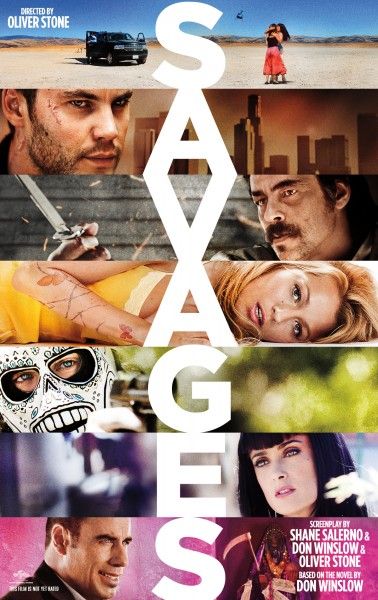A wise man once said*, "If you have them in the first fifteen minutes, you have a movie. If you have them in the last fifteen minutes, you have a hit." By that metric, Oliver Stone's Savages is neither a movie nor a hit. It begins with an atrocious first act full of flat expository narration including one of the worst lines of dialogue I've ever heard: "I have orgasms. He has wargasms." That's a deep hole to dig out of, but Savages manages to do so with a strong, thoughtful, exciting middle section that explore where people derive their power. And then the movie falls apart with an ending that erases all the hard work the film had accomplished.
Chon (Taylor Kitsch) and Ben (Aaron Johnson) are Laguna Beach-based marijuana kingpins who run the ideal business. They have the finest product, deal fairly with all their employees and customers, and their skill sets compliment each other. Ben is the crunchy-granola botanist who knows how to manufacture the high-quality pot, and he uses his proceeds to fund charitable endeavors. Chon is the practical muscle who deals with the dangerous side of the business. They work so well together that they're in a healthy, happy polygamous relationship with O (Blake Lively). Their perfect world is thrown into chaos when a brutal Mexican drug cartel run by Elena (Salma Hayek) initiates a hostile takeover by kidnapping O. Ben and Chon must then figure out how to get their girl back and get out alive.
Savages gets off to an awful start with O's horrible narration, which derives partly from Lively's listless reading and partly from Stone, Shane Salerno, and Don Winslow's atrocious dialogue. Stone should know better than to have one character flatly describe each new character rather than show us how that character behaves. Granted, there's a lot of ground to cover in the facets of Ben and Chon's business, but there's no reason for O to tell us the personalities of those involved. Matters are made worse as we see Stone try to ape the ADHD-riddled editing style of Tony Scott. It's never as bad as Scott's films, but Stone never captures the chaotic feel he's going for.
However, we eventually acclimate to the direction as the ideas at the center of Savages begin to come to the forefront and O's narration fades away. While Stone has never shied away from being an overt propagandist (good non-documentary directors don't tell you what you should think about an issue), he's far more subtle in exploring the power dynamic of the various characters. Elena's right-hand man, Lado (Benicio Del Toro chewing every piece of scenery he can find), and his crew go under the guise of being gardeners. In America, Hispanics are viewed as powerless laborers, but they can be mad tyrants as long as they keep to a particular business in a particular country. The movie also does a nice job of comparing O, a woman whose very life depends on her male protectors, with Elena, a woman who has had to assume the position of a man in order to say in power. I don't agree with the film's argument that women can only find power by either being with men or acting like them, but it holds true to the film's exploration of how we view power. It also appeals to how we view violence as power. We may side with Ben's view that compromise and reconciliation will yield peace, but Chon, an ex-soldier (the guy who has wargasms), knows there can only be domination in their business.
Of course, the film makes a bit of a poor choice in selecting their business. Dealing marijuana on a massive scale might be as violent and dangerous as depicted, but the drug itself doesn't mirror the intensity of the conflict. Stone and his co-writers may be trying to draw a biting irony, but pot undermines both the characters' barbaric actions and Stone's aggressive direction. There's a reason Tony Montana doesn't blaze up a joint before going on a murderous rampage at the end of Scarface.
Savages requires pot because of the contrast between Ben and Chon. Ben wouldn't be involved in any other drug, although a harsher drug would show him to be an extreme hypocrite or deeply deluded). But like Stone's direction and the film's other weaknesses, we get past the inconsistency because the action is solid, the ideas are worthwhile, and some of the performances are top notch. Kitsch does a terrific job as a character who's indulging his violent tendencies by using O's kidnapping as an excuse. Hayek makes for a great villain who also arouses our sympathy because the character has had to lose her relationship to her children in order to protect them. And while Del Toro's character may be one-dimensional, he's endlessly entertaining (at times I liked to imagine Savages as a sequel to Traffic, and Del Toro's character from Soderbergh's movie had gone horribly astray).
And then it all falls apart at the end. The ending plays as a giant, confused "fuck you" to the audience. It almost feels like the ending is played out of order, since a different edit would yield a far more power for close rather than simply ditching the scenes altogether. It's an ending that leaves you laughing and shaking your head. In that way, Savages comes full circle.
Rating: C+
*I believe it was Paul Newman, but correct me if I'm wrong.




